Best Dog Food for Diarrhea

DogFoodAdvisor is reader supported See how
All reviews are 100% impartial but if you buy using links on this page, we may earn a referral fee.
What’s the best dog food for diarrhea?
When a dog is experiencing diarrhea, it’s important to provide them with a gentle and easily digestible diet.
Consult with your veterinarian to see if a prescription diet specifically formulated for digestive issues is appropriate for your dog.
You can also look for dog foods that have limited ingredients to minimize the risk of triggering food sensitivities or allergies. These diets typically contain a single source of protein and a limited number of easily digestible carbohydrates such as chicken, oats and sweet potato.
Probiotics can help promote a healthy balance of gut bacteria, which may aid in resolving diarrhea in dogs, so choose a food that contains added probiotics.
Foods that are high in soluble fiber, such as canned pumpkin or cooked sweet potatoes, can help firm up the stools and regulate bowel movements. These can be added to your dog’s regular food or used as a temporary diet option.
Remember to introduce any new food gradually and monitor your dog’s response. If the diarrhea persists or worsens, it’s crucial to consult with your veterinarian for a proper diagnosis and treatment plan.
Below is our recommendations of the best foods to give a dog with diarrhea.
You’ll also learn the answer to each of the most frequently asked questions we get about dogs with diarrhea.
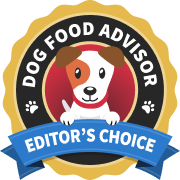
Best Dog Food for Diarrhea April 2024
Here are The Dog Food Advisor's best dog food brands for diarrhea for April 2024.
-
1. Simply Nourish
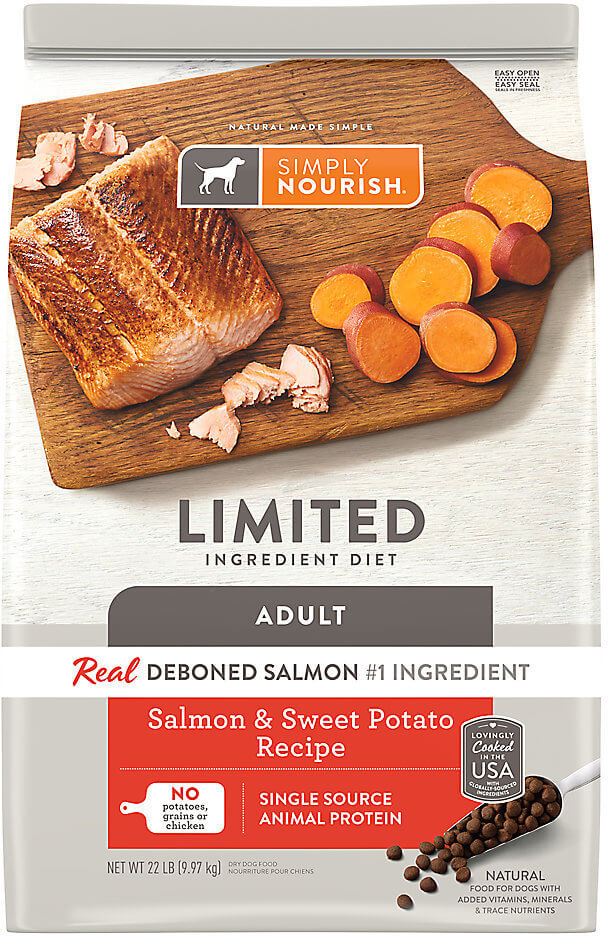
Salmon & Sweet Potato is one of 7 recipes included in our review of the Simply Nourish Limited Ingredient product line.
Simply Nourish Limited Ingredient Diet Adult Dry Dog Food – Salmon & Sweet Potato Recipe derives the bulk of its protein from salmon. Dry matter label analysis reveals the recipe contains 28.9% protein, 14.4% fat and 48.7% estimated carbs… resulting in a fat-to-protein ratio of about 50%.
Read our review of the full Simply Nourish Limited Ingredient Diet Dog Food (Dry) range here
Main Ingredients Deboned salmon, salmon meal, dried sweet potatoes, dried peas, dried lentils Type Grain-Free Protein Percentage 28.9% AAFCO Standards All Life Stages Best For Puppies and Dogs Sample buyer review...
Read more buyer reviews at Petsmart"I bought this for my doggo a week or so ago, she has a lot of digestive issues. She loves it and has no issues. I also mix this with the Simply Nourish wet dog food of salmon and tuna. It's a good mixture she loves, vets say it's OK. I love this brand!"
-
2. Wellness
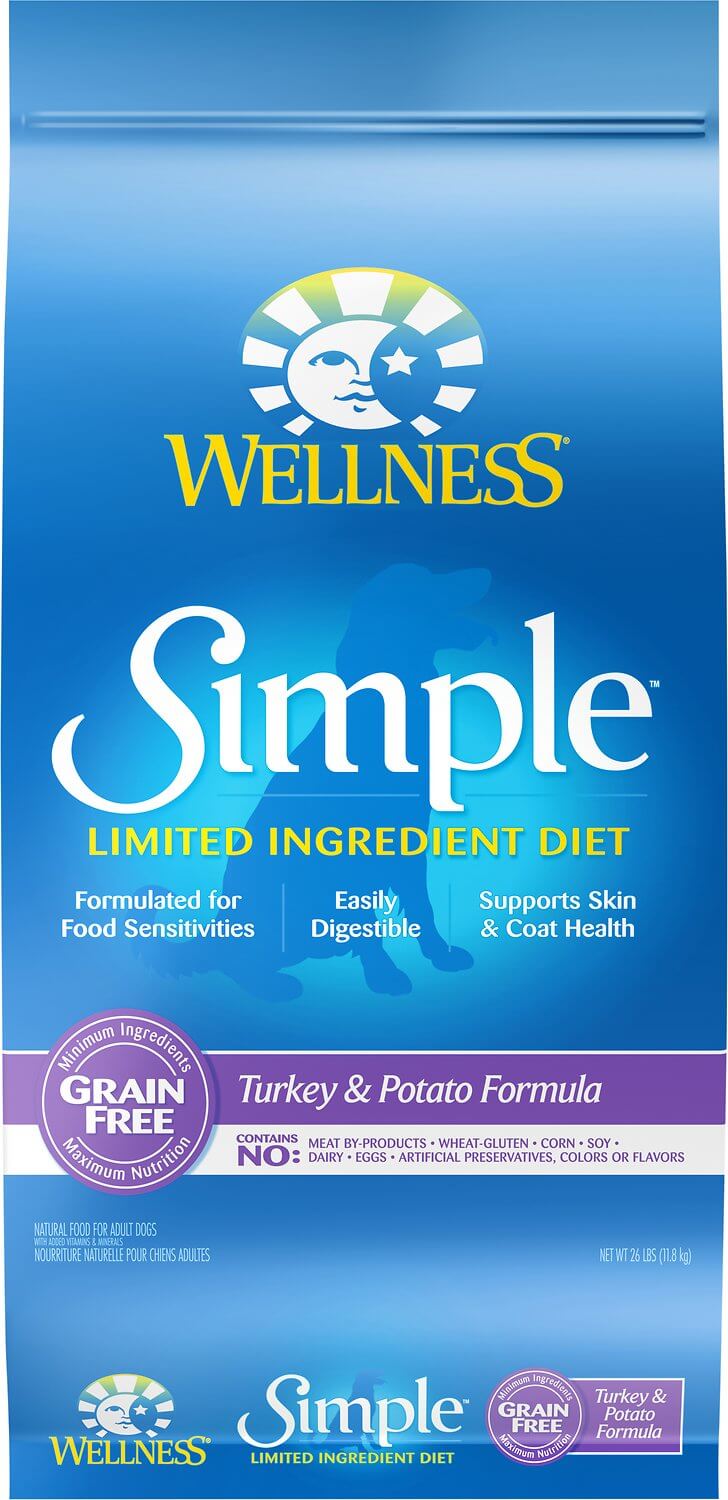
Turkey & Potato is one of 6 recipes included in our review of the Wellness Simple product line.
Wellness Simple Limited Ingredient Turkey & Potato formula derives the bulk of its meat protein from turkey. Dry matter label analysis reveals the recipe contains 29.2% protein, 13.5% fat and 49.3% estimated carbs… resulting in a fat-to-protein ratio of about 46%.
Read our review of the full Wellness Simple Limited Ingredient Dog Food (Dry) range here
Main Ingredients Deboned turkey, turkey meal, potatoes, peas, dried ground potatoes Type Grain-Free Protein Percentage 29.2% AAFCO Standards Maintenance Best For Dogs Sample buyer review...
Read more buyer reviews at Wellnesspetfood.com"My dog's eagerly enjoy this food and it agrees with their sensitive tummies."
-
3. Purina
Chicken is one of 12 recipes included in our review of the Purina One product line.
Purina One Plus Digestive Health Formula Chicken derives the bulk of its meat protein from chicken. Dry matter label analysis reveals the recipe contains 28.4% protein, 18.2% fat and 45.4% estimated carbs… resulting in a fat-to-protein ratio of about 64%.
Read our review of the full Purina One SmartBlend True Instinct Dog Food (Canned) range here
Main Ingredients Chicken, rice flour, whole grain corn, corn gluten meal, whole grain wheat Type Grain-Inclusive Protein Percentage 28.4% AAFCO Standards Maintenance Best For Dogs Sample buyer review...
Read more buyer reviews at Purina.com"He loves it! It has two different textures which I think he’s enjoys. It’s good on his stomach as well! Vet recommended this brand too!"
-
4. Wellness
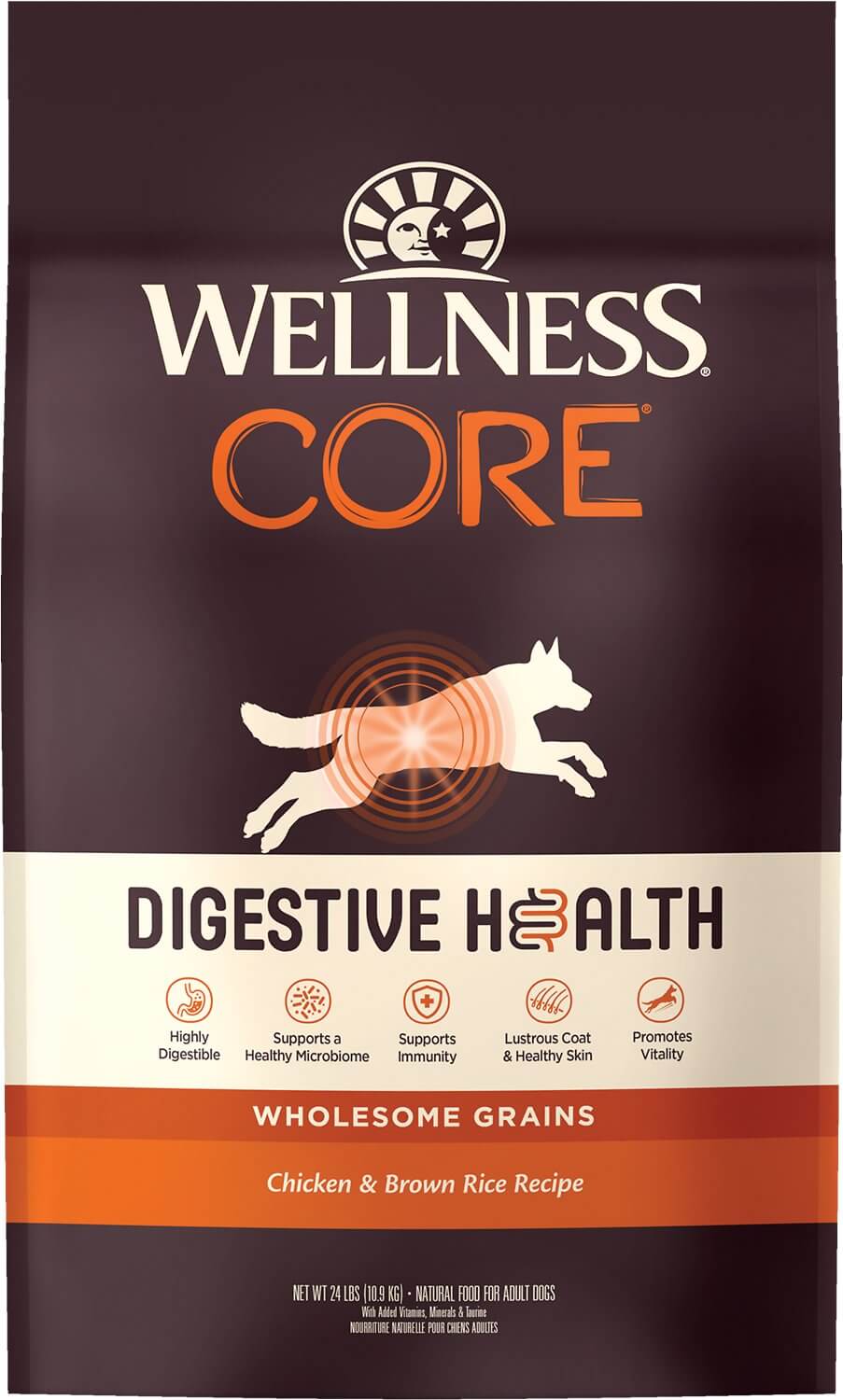
Chicken & Brown Rice is one of 6 recipes included in our review of the Wellness Core Digestive Health Puppy Range product line.
Wellness CORE Digestive Health puppy chicken and brown rice derives the bulk of its meat protein from chicken. Dry matter label analysis reveals the recipe contains 34.4% protein, 17.2% fat and 40.3% estimated carbs… resulting a fat-to-protein ratio of about 50%.
Read our review of the full Wellness Core Digestive Health Dog Food (Dry) range here
Main Ingredients Deboned Chicken, Chicken Meal, Brown Rice, Barley, Oat Groats Type Grain-Inclusive Protein Percentage 34.4% AAFCO Standards Growth Best For Puppies Sample buyer review...
Read more buyer reviews at Wellnesspetfood.com"I did so much research on different ingredients in puppy foods for dogs with sensitive digestive systems and this one won the cake. I ordered a small 4lb bag to transition from Royal Canin Gastrointestinal for Puppies and she loves it. I'm excited to see how it helps her digestion as she has trouble with consistency."
-
5. Horizon Pet Food
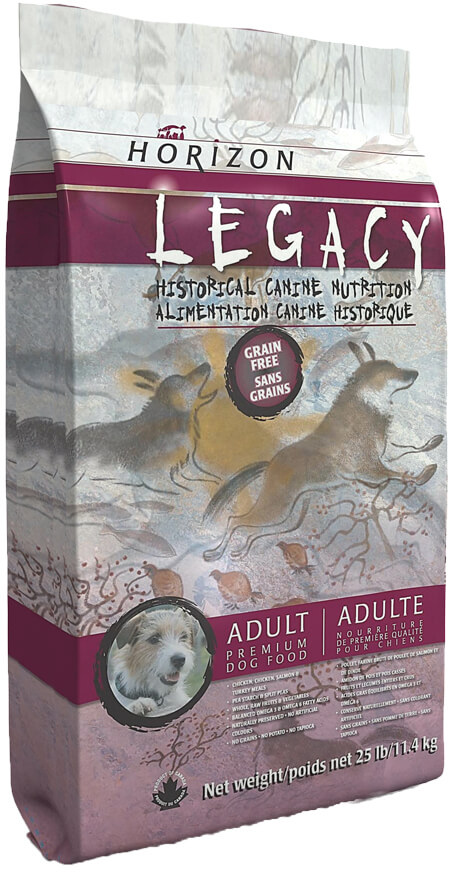
Horizon Legacy Farm Country Blend is one of 5 recipes included in our review of the Horizon Legacy product line.
Horizon Legacy Farm Country Blend derives the bulk of its meat protein from chicken. Dry matter label analysis reveals the recipe contains 37.8% protein, 16.7% fat and 37.6% estimated carbs… resulting a fat-to-protein ratio of about 44%.
Read our review of the full Horizon Legacy Dog Food (Dry) range here
Main Ingredients Chicken, chicken meal, turkey meal, peas, pea flour Type Grain-Free Protein Percentage 37.8% AAFCO Standards All Life Stages Best For Puppies & Dogs Sample buyer review...
Read more buyer reviews at Chewy.com"This food is excellent! My dog isn't super picky, but her poos have been really good and not super smelly, which rules. I do supplement with some grains (home cooked rice) because I know where said grains came from. Highly recommend."
-
6. Diamond
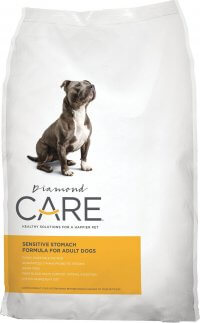
Sensitive Stomach Formula is one of 4 recipes included in our review of the Diamond Care product line.
Diamond Care Sensitive Stomach Formula derives the bulk of its protein from potato’s and eggs. Dry matter label analysis reveals the recipe contains 27.8% protein, 14.4% fat and 49.8% estimated carbs… resulting in a fat-to-protein ratio of about 52%.
Read our review of the full Diamond Care Dog Food (Dry) range here
Main Ingredients Potatoes, egg product, potato protein, tomato pomace, chicken fat Type Grain-Free Protein Percentage 27.8% AAFCO Standards Maintenance Best For Dogs Sample buyer review...
Read more buyer reviews at Diamondpet.com"Our puppy is 1 1/2 years old and I have been dealing with loose stool and diarrhea since getting him. Have tried sooooooo many different foods...this one works!!!!!!! Thank you Diamond Care."
-
7. Instinct
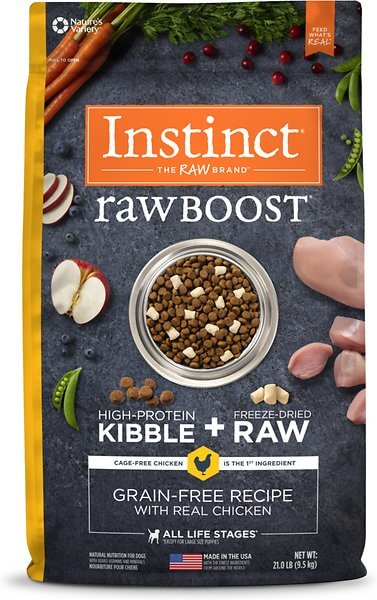
Gut Health with Real Chicken is one of 12 recipes included in our review of the Instinct Raw product line.
Instinct Raw Boost Gut Health Grain-Free Recipe with Real Chicken & Freeze derives the bulk of its meat protein from chicken. Dry matter label analysis reveals the recipe contains 38.3% protein, 35.1% fat and 18.6% estimated carbs… resulting a fat-to-protein ratio of about 92%.
Read our review of the full Instinct Raw Boost Dog Food (Dry) range here
Main Ingredients Chicken (including Ground Chicken Bone), Chicken Liver, Chicken Heart, Pumpkinseeds, Carrots Type Grain-Free Protein Percentage 38.3% AAFCO Standards All Life Stages Best For Puppies & Dogs Sample buyer review...
Read more buyer reviews at Instinctpetfood"i bought this yesterday and my service dog loves this its expensive but worth it she eats so fast i have to hand feed her because she loves it!"
More Top Picks
To view more top dog foods by category… click the link below that best meets your personal feeding needs.
Frequently Asked Questions
What could be causing my dogs diarrhea?
There are several potential causes for a dog to develop diarrhea.
Abrupt changes to their diet or introducing new food items can disrupt their digestive system and lead to diarrhea. You may find this article about how to switch a dog’s food without making it sick, helpful.
Some dogs may have sensitivities or allergies to certain ingredients in their food, such as grains, dairy, or specific proteins, which can result in diarrhea.
Dogs are known for their curious nature, and they may ingest things they shouldn’t, such as garbage, spoiled food, toxic substances, or foreign objects. This can irritate the digestive system and cause diarrhea.
Common infections, such as bacterial gastroenteritis, viral infections (like parvovirus), or parasitic infestations (such as giardia or worms), can all lead to diarrhea in dogs.
And just like us, dogs can experience stress or anxiety due to changes in their environment, routine, or social interactions and this emotional distress can manifest as diarrhea.
Certain medications or medical treatments, including antibiotics, can disrupt the balance of beneficial gut bacteria and result in diarrhea as a side effect.
And issues with the pancreas or liver, such as pancreatitis or liver disease, can affect digestion and lead to diarrhea; as well as inflammatory bowel disease, an immune-mediated condition that causes chronic inflammation of the gastrointestinal tract, leading to diarrhea among other symptoms.
When should you take a dog with diarrhea to the vet?
It’s important to seek veterinary attention in cases where the diarrhea is frequent, contains blood, or lasts for more than 24-48 hours.
Diarrhea can lead to dehydration, especially if it’s accompanied by vomiting or if your dog is not drinking enough water. Signs of dehydration include dry gums, sunken eyes, lethargy, and loss of skin elasticity. If you suspect your dog is dehydrated, prompt veterinary care is necessary.
Diarrhea can be more serious in very young puppies or older dogs, as they may have weaker immune systems and are more prone to dehydration. It’s best to err on the side of caution and have them evaluated by a veterinarian.
Can I treat my dog's diarrhea at home, or do I need medication?
In some cases, mild cases of diarrhea in dogs can be managed at home with appropriate care. However, it’s important to monitor your dog closely and consult with a veterinarian to determine the best course of action.
Here are some general guidelines for treating your dog’s diarrhea at home:
Withhold Food for a Short Period: Giving your dog’s digestive system a break by withholding food for 12 to 24 hours (while ensuring access to water) can help calm the gut. This is usually recommended for adult dogs, but consult your vet for specific guidance based on your dog’s age and health condition.
Gradually Introduce a Bland Diet: After the fasting period, reintroduce a bland diet consisting of easily digestible and low-fat foods. Boiled chicken and plain white rice are commonly used. Other options include boiled lean ground meat (such as turkey) and boiled sweet potatoes. Feed small, frequent meals to avoid overwhelming the digestive system.
Probiotics: Probiotics are beneficial bacteria that can help restore the balance of gut flora. They may aid in resolving diarrhea. Your veterinarian can recommend a suitable probiotic for your dog, or you can try adding plain, unsweetened yogurt with live cultures to their food.
Hydration: Ensure your dog has access to fresh water at all times to prevent dehydration. If they’re not drinking enough water, you can try providing small amounts of electrolyte solutions specifically formulated for dogs. Pedialyte, diluted chicken broth (without onions or seasonings), or specialized dog rehydration solutions may be options.
Monitor and Assess: Keep a close eye on your dog’s condition. If the diarrhea persists, worsens, or if your dog shows other concerning symptoms, it’s important to consult with a veterinarian for further evaluation and guidance. They may prescribe medications, such as anti-diarrheals or antibiotics, depending on the underlying cause.
Can I still exercise my dog while they have diarrhea?
When your dog has diarrhea, it’s generally best to limit their exercise until their condition improves.
Diarrhea can cause dehydration and nutrient loss in dogs. Resting and conserving energy allows the body to focus on healing and recovering from the digestive upset.
Dogs with diarrhea may experience abdominal discomfort, urgency, or frequent bowel movements. Engaging in strenuous exercise or vigorous activity can exacerbate these symptoms and increase the risk of accidents or further digestive upset.
Diarrhea can lead to fluid loss and dehydration. Vigorous exercise can increase fluid loss through panting and sweating, further compromising hydration levels.
If your dog’s diarrhea is caused by a contagious infection, such as a bacterial or viral gastroenteritis, allowing them to interact with other dogs during exercise can contribute to the spread of the illness.
However, light to moderate activity such as short walks on a leash for bathroom breaks is generally acceptable. Monitor your dog closely during these outings and ensure they have access to water for hydration. If your dog appears lethargic, refuses to move, or exhibits signs of discomfort, it’s best to skip exercise altogether until they recover.
Remember, each dog and situation is unique, so it’s important to consult with your veterinarian for specific guidance based on your dog’s health, the severity of the diarrhea, and any underlying conditions. They can provide tailored recommendations for managing exercise during this period.





